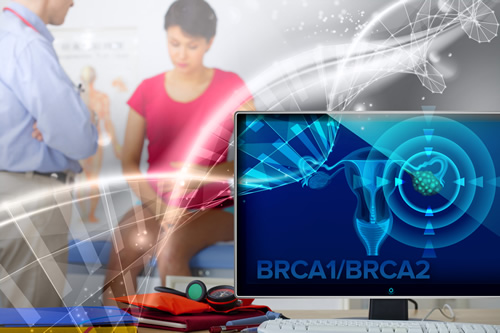Last updated: November 02, 2015
Women with inherited breast cancer risk face numerous challenges
Genome Advance of the Month
Women with inherited breast cancer risk face numerous challenges
By Bianca Patel
Scientific Program Analyst, NHGRI
As genetic testing for hereditary cancer has become more widespread, researchers are grappling with questions about the impact this information will have on individuals, their families and the healthcare system. Will individuals understand their genetic test results, particularly if the results are not definitive? Will the information affect how individuals manage their health? Are healthcare professionals ready to help at-risk individuals make informed choices about their care? How will an already overburdened healthcare system incorporate this information into the standard of care?
This Genome Advance of the Month spotlights a Swiss study on women who are at increased risk for inherited breast cancer and the long term challenges they face in managing their care. It also identifies some of the challenges of providing care to at-risk individuals and highlights opportunities for improved models of care.
According to a study published in Genetics in Medicine, Maria Caiata-Zufferey, Ph.D. at the University of Geneva in Switzerland and a team of Swiss researchers from four different genetic-counseling centers interviewed a group of 32 French- and Italian- speaking women who carried the BReast CAncer genes 1 and 2 (BRCA1/BRCA2). The study's supporting statistics state that a woman carrying BRCA1 and BRCA2 mutations has a significant probability of developing breast or ovarian cancer (as high as 75 percent) within her lifetime, and these mutations account for 20 to 25 percent of all inherited breast cancers.
Researchers interviewed women, ages 26-60, who were unaffected by disease and had known of their positive mutation status for at least three years. Participants generally viewed the recommended health guidelines in two ways: as a rational and moral responsibility (i.e., something they were obligated to follow) or as a questionable option (i.e., something ambiguous and uncertain at times).
Current Swiss guidelines for managing health and minimizing breast or ovarian cancer in at-risk individuals include:
- Breast exams and breast magnetic resonance imaging (MRI)
- Mammograms
- Transvaginal ultrasounds and blood tests
- Removal of the fallopian tubes and ovaries
- Removal of the breasts
Women who felt strongly that they should adhere to the medical guidelines were influenced by a number of psychosocial factors, including: pressure from healthcare providers to minimize their cancer risk; a duty to stay healthy for their families; the desire to be a role model to family members who may have inherited the same mutations; and a personal desire to overcome their genetic risk.
At the same time, these women felt confused about the appropriate way to deal with genetic risk for several reasons:
- Contradictory views of healthcare professionals who were part of the care team (gynecologists, radiologists, surgeons and medical geneticists in collaboration with a primary care physician)
- Poorly informed specialists or physicians who developed their own interpretation of the care guidelines
- The possible impact on life events such as maternity and breast feeding
- No guarantee that the recommended care would reduce the risk of developing breast cancer
Participants found it difficult to actively pursue their health programs for several other reasons. Because the women weren't sick, it was up to them to organize their medical exams and decide how to proceed, sometimes without adequate input from their physicians. Because of the personal nature of the disease, the women found it difficult to connect and share information with others undergoing the same experience. And because the women weren't sick, healthcare professionals classified them as "not urgent cases" for appointments or feedback on screening results.
Other studies have noted that primary care physicians have the greatest contact with patients and are likely to be the first provider asked about genetic testing. However, most primary care physicians are not trained in medical genetics, diagnostic testing and genetic counselling. Thus, it's important that healthcare professionals are educated in the scientific, interpersonal and ethical issues related to genetic testing; improve communication with at-risk individuals; and apply evidence-based care guidelines consistently, the Swiss researchers wrote. Women with the BRCA1/BRCA2 mutation would also benefit from multi-disciplinary hereditary cancer clinics that could provide specialized information, emotional support and knowledge from women with similar conditions, concluded the researchers.
Read the article
Caiata-Zufferey, M., Pagani, O., Cina, V., Membrez, V., Taborelli, M., Unger, S., Murphy, A., Monnerat, C., Chappuis, P. Challenges in managing genetic cancer risk: A long-term qualitative study of unaffected women carrying BRCA1/BRCA2 mutations. Genetics in Medicine, 17(9):726-32. 2015. [Genetics in Medicine]
Posted: November 2, 2015

